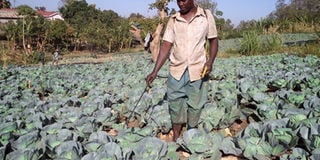Brothers earning millions from cabbages

Agronomists say the area should be considered because some areas are sensitive and the valuable plants nearby could be affected by drift. FILE PHOTO
What you need to know:
- After suffering losses in their produce trading business, three brothers decided to directly invest in farming, Joel Tooyeronga writes.
Gimogo Mohamubi, 36, Difasi Webisa, 40, and Wambehde Kamilu, 45, who are residents of Kasubi Central in Bardege Division, Gulu Municipality, are commercial farmers growing mostly cabbages.
Before they were farmers, the three brothers were businessmen based in Mbale dealing in agricultural produce. They regularly came to Gulu to sell onions, carrots and matooke but due to losses they occasionally encountered they decided to involve themselves directly in commercial farming.
Starting out
When they started in 2009, they began with tomatoes though they did not abandon their other business.
However, they realised that even though tomatoes were earning well, they are capital and labour intensive. So they decided to venture in cabbages as well.
“We hired one acre of land at Shs 500,000 a year and bought cabbage seeds from an agro-input shop,”
explains Gimogo Mohamubi.“We then prepared seed beds and added manure to the soil.”
After three weeks, they planted the seeds in the seed bed. When they germinated, they applied pesticides and fertilisers such as NPK.
A month later, the seedlings were transplanted to the main garden. “It is important to transplant in the evening when it is cooler to avoid the seedlings from being affected by heat from the sun. We ensure the garden is weed free because these compete with the vegetables for soil nutrients,” he adds.
It is also very important to spray the cabbages with pesticides twice a month, because insects damage the cabbages when they eat the leaves.
“We also water the crops every morning and evenings during dry season because cabbages needs water to grow,” Webisa points out.
Cabbages take about three months from when they are planted in the main garden to harvest. “Currently, we earn about Shs12m from the cabbages we plant and harvest twice a year,” he says.
Market
Cabbages have large local and external markets, especially in South Sudan.
When other vegetables are scarce in the market, the prices of cabbages rise and the buyers buy directly from the farmers in the garden. “Our main market is South Sudan and Gulu. However we also sell to locals who come to the garden. We sell one cabbage between Shs500 and Shs3,000 depending on the size,” says Wambehde Kamilu.
Benefits
The brothers say they have benefitted a lot from their business.
“Sending our children to school is not a problem as we are able to pay fees and support our family in Mbale. Each of us has bought land there with the money and built a house for our parents”.
Challenges
The main challenge is pests. To avert this, they spray the plants with insecticides. “We also face challenges in buying the pesticides since they are expensive and are difficult to find in Gulu. This requires us to travel to Kampala,” notes Mohamubi.
Another challenge is the theft of the cabbages by people in the neighbourhood.
The insecurity in South Sudan, which is their main market, poses yet another challenge. The situation has led to a drop in prices.
Aspirations
Far from home. Nevertheless they also feel homesick. “We plan to go back to Mbale and settle with our family since the children are growing without us around.”




